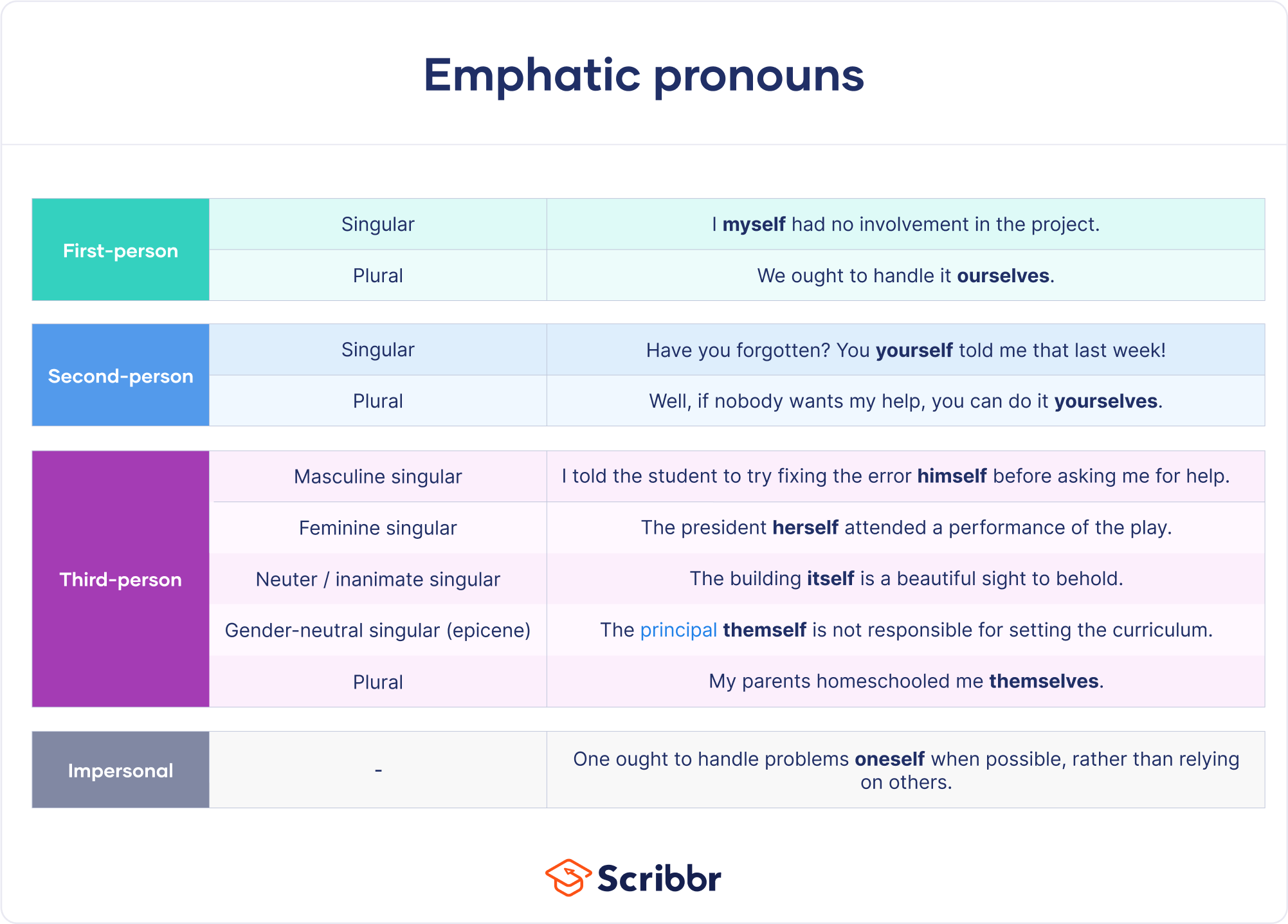Emphatic Pronouns | Examples, Definition & List
An intensive pronoun or emphatic pronoun is a word that’s used to place special emphasis on another noun or pronoun (e.g. ‘the man himself‘). It can indicate something special or unexpected or distinguish the person or thing in question from others.
In English, emphatic pronouns are identical to reflexive pronouns – both always end in -self or -selves – but their grammatical functions are different. There are emphatic forms of all the personal pronouns and of the impersonal pronoun ‘one’.
| First-person | Singular | I myself had no involvement in the project. |
|---|---|---|
| Plural | We ought to handle it ourselves. | |
| Second-person | Singular | Have you forgotten? You yourself told me that last week! |
| Plural | Well, if nobody wants my help, you can do it yourselves. | |
|
|
Masculine singular | I told the student to try fixing the error himself before asking me for help. |
| Feminine singular | The president herself attended a performance of the play. | |
| Neuter / inanimate singular | The building itself is a beautiful sight to behold. | |
| Gender-neutral singular (epicene) | The principal themself is not responsible for setting the curriculum. | |
| Plural | My parents homeschooled me themselves. | |
| Impersonal | — | One ought to handle problems oneself when possible, rather than relying on others. |
How are emphatic pronouns used in sentences?
An emphatic pronoun always appears in combination with a noun or another pronoun; it can’t stand on its own as a subject or object.
- Myself have never been to Australia.
- I myself have never been to Australia.
- Why don’t you ask himself?
- Why don’t you ask the man himself?
The emphatic pronoun most commonly appears directly after the antecedent (the noun or pronoun it refers to), but it can also appear later in the sentence. The kind of emphasis provided can vary based on the placement of the emphatic pronoun.
You should do it yourself. [more emphasis on the fact the action will be performed alone]
The emphatic pronoun occasionally appears before the antecedent, separated from it with a comma. The emphasis is similar to placing it directly after the antecedent. This is a less common word order and tends to read less smoothly than other options.
Emphatic vs reflexive pronouns
All the same words that function as emphatic pronouns can also be used as reflexive pronouns. While the words are identical, their grammatical function in each case is different:
- An emphatic pronoun is used in combination with a noun or pronoun, on which they place special emphasis. The sentence will still make sense (though the emphasis will change) if it is removed.
- A reflexive pronoun is used in place of an object pronoun when the subject and object are the same person or thing. It’s essential to the meaning of the sentence.
Give yourself a break. [‘Give a break’ isn’t a complete sentence.]
The robot can complete many tasks itself. [‘The robot can complete many tasks’ is a complete sentence.]
The investment pays for itself. [‘The investment pays for’ isn’t a complete sentence.]
Frequently asked questions
Sources for this article
We strongly encourage students to use sources in their work. You can cite our article (APA Style) or take a deep dive into the articles below.
This Scribbr articleCaulfield, J. (2023, May 15). Emphatic Pronouns | Examples, Definition & List. Scribbr. Retrieved 9 April 2025, from https://www.scribbr.co.uk/nouns/emphatic-pronoun/
Aarts, B. (2011). Oxford modern English grammar. Oxford University Press.
Butterfield, J. (Ed.). (2015). Fowler’s dictionary of modern English usage (4th ed.). Oxford University Press.
Garner, B. A. (2016). Garner’s modern English usage (4th ed.). Oxford University Press.




